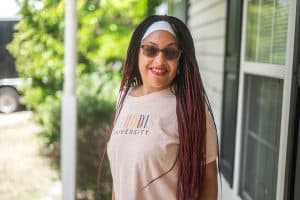
Kourtney Johnson thought she had her career all figured out. As an up-and-coming chef, she was determined to utilize her skills to make people happy and improve the community. But life had its own plans for Johnson.
Kourtney Johnson thought she had her career all figured out. As an up-and-coming chef, she was determined to utilize her skills to make people happy and improve the community. But life had its own plans for Johnson.
When she was 26, Johnson suffered two separate accidents at work and in a car, leading to various diagnoses by doctors: rheumatoid arthritis, spina bifida, and scoliosis. Her life was turned completely upside down a new career path was needed.
Johnson realized she could help people in a different way – through their mental health. She turned to another passion in psychology. After earning a bachelor’s degree, it has led her to one of Methodist University’s newest programs: an online master’s degree in Clinical Mental Health Counseling.
“I want to be that advocate and that voice to help the military and African American community,” said Johnson, who considers herself a Korean native before finding a home in Fayetteville. “The online program is allowing me to work on becoming a sound board for future generations.”

Johnson is part of the first class of students taking part in Methodist University’s Clinical Mental Health Counseling program – an online master’s program that is capturing attention from around the region.
“You’ll find a few similar programs in the region, but they’re all completely in-person or hybrid,” said Dr. Keleigh Blount, director of the Clinical Mental Health Counseling program. “But Methodist University’s program is different because it’s asynchronous and can be completed online.”
Clinical mental health counseling primarily focuses on overall mental well-being and mental health of people – training students to diagnose, plan treatments, and use different therapeutic strategies such as animal assistance therapy, trauma-focused therapy, and more to help people feel at their best.
The two-year program consists of one year of didactic learning that teaches the basics of the profession, how to get licensed, and the concept of developmental approach. After that, students have the opportunity for hands-on learning through a year of clinical work. Since the program is online, students are able to earn 700 hours of clinical work through any clinical mental health counseling site of their choice as long as certain criteria are met.
“Some of our students are in the military and some of our students are parents,” Blount said. “Students are already telling us that they enjoy the asynchronous model and the flexible deadlines. We want them to be healthy and well in this program.”
So far, the program has welcomed students from all the way in Texas to its home state of North Carolina. Johnson, a military spouse, is one of the local students who is able to complete all of her classwork from the comfort of her Fayetteville home.
“Even though I’m an online student, I love the fact that the University still pays attention to me,” Johnson said. “My advisor is my biggest cheerleader. She’ll reach out and tell me how amazing I’m doing and that she’s proud of me. Then, you have the professors who are amazing.”
Methodist University’s Clinical Mental Health Counseling program currently has the expertise of Blount and Dr. Elisabeth Simpson, clinical placement coordinator for the program. Both continue to work as counselors while teaching and offer expertise in disability, mental health, research, families, the criminal justice system, cancer treatment, and others.
Along with the program’s top-notch faculty and unique learning model is the ability to work with Methodist University’s renowned health sciences programs – such as Physician Assistant Studies, Doctor of Occupational Therapy, Doctor of Physical Therapy, and Nursing.
“One of the beautiful things about our program is that we are building it to be more interdisciplinary than other similar programs,” Blount added. “With the pending medical school coming to Methodist University, we wanted to work with the other health sciences programs to have cross work. We can work with their students on how to handle certain subjects like substance abuse.”
The program can begin pursuing accreditation from the Council for Accreditation of Counseling and Related Educational Program (CACREP) once the first class of students graduates in May 2025 – a time that Johnson looks forward to.
“Next, I want to start working on my doctorate so I can begin working in forensic psychology,” Johnson said. “I love forensic cases and I want to help victims of domestic violence, trauma, addiction, and clinical mental health issues. I just want to be able to help people.”
Johnson has come a long way since first learning about her diagnoses in her mid-20s, a road that wouldn’t be possible without her education at Methodist University.
“I love Methodist University,” she added. “It’s taught me how to center my emotions and how to give myself credit through all of the difficult times. With the help of Methodist University, I know I can become the clinical psychologist I want to be without a shadow of doubt.”
To learn more or apply to Methodist University’s Clinical Mental Health Counseling program, visit the program webpage.